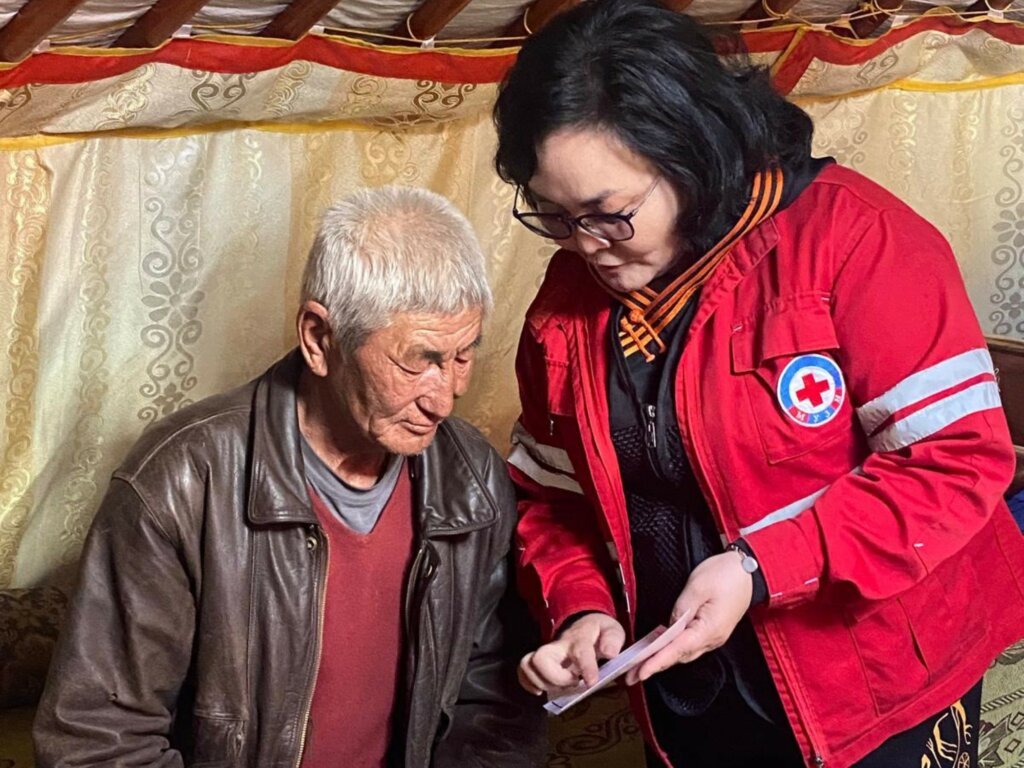
بدءًا من أواخر عام 2023، شهدت منغوليا أحد أقسى فصول الشتاء منذ ما يقرب من قرن من الزمان. ونتيجة لذلك، تأثرت البلاد على نطاق واسع دزود — a compound hazard encompassing heavy snowfall, extreme cold, and windstorms — created treacherous living conditions for the livestock of herder communities across the country, leading to profound socioeconomic challenges. Integrating elements of المشاركة المجتمعية والمساءلة is vital in emergency settings such as this one, as it ensures that aid is tailored to the needs of affected communities. In response to this slow-onset disaster, our CEA Advisor Jonath Lijftogt was تم نشره إلى منغوليا مع الاتحاد الدولي لجمعيات الصليب الأحمر والهلال الأحمر (الاتحاد الدولي لجمعيات الصليب الأحمر والهلال الأحمر) للمساعدة جمعية الصليب الأحمر المنغولي مع دعم أسر الرعاة خلال هذه الفترة وما بعدها.
“Integrating a CEA system into an emergency response operation from day one helps us to better serve people affected as it allows us to modify or amplify our interventions, improving trust and perceptions in the communities. Such enhanced trust helps National Societies to be stronger local humanitarian actors.”
Manish Tewani, Operations Manager at IFRC
معالجة الاحتياجات في ظل المخاطر المتراكمة
Upon Jonath’s arrival in Ulaanbaatar in April, the dzud had already ravaged the rural regions. The snow had melted and refrozen multiple times, trapping grass beneath layers of ice and making it inaccessible for livestock to feed on. As spring approached, those animals that had survived the brutal winter were frail and unable to access the fresh grass that had only just begun to grow. These unpredictable weather conditions left herder families in Mongolia, who often live in remote areas and almost exclusively rely on their livestock for income and food, in desperate need of support.

ركزت الاستجابة في المقام الأول على دعم أسر الرعاة التي يقل عدد حيواناتها عن 400 حيوان ولا تملك أي مصادر دخل إضافية. وقامت جمعية الصليب الأحمر المنغولي، بالتعاون مع الاتحاد الدولي لجمعيات الصليب الأحمر والهلال الأحمر، بتوزيع مستلزمات رعاية الحيوانات والنقد وطرود الطعام على أسر الرعاة لتلبية احتياجاتهم الفورية. كما قدمت الحكومة المنغولية التبن والأعلاف لإعالة الحيوانات الناجية، وأزالت الطرق التي أغلقتها الثلوج. وللتخفيف من التأثير النفسي الناجم عن الدزود، والذي يتجلى في الاكتئاب والتوتر وآليات التكيف السلبية، كان الدعم النفسي والاجتماعي جزءًا لا يتجزأ من الاستجابة للطوارئ.
CEA: إشراك المجتمعات في الاستجابة
Jonath’s role involved implementing CEA principles in this emergency response – essential in ensuring that the support provided meets the communities’ actual needs. In emergency responses, community engagement is vital to avoid leaving critical needs unmet. In this context, the CEA activities included joining distributions and visiting herder families, local community stakeholders, volunteers, and branch staff to gather concerns and identify gaps in the response:
“We saw people coming out of isolation, happy to see and talk to others again. There was relief because of the snow melting, but increased worry about the state of their animals. We also heard about how people were getting to distribution sites, and to what extent they knew of the support they received.”
جوناث ليفتوغت، مستشار CEA في الصليب الأحمر الهولندي
On more programmatic levels, Jonath mapped existing communication channels and feedback mechanisms already operated by the Mongolian Red Cross Society, such as their helpline for those in need of assistance. Based on the results, the analysis and visualisation of feedback data was introduced through a dashboard providing clear insights into community needs and questions. In addition, an information package was created for herders on how and where to access aid. CEA capacity building was a core part of Jonath’s deployment, with Mongolian Red Cross Society staff and volunteers strengthening their skills to implement CEA practices effectively in emergencies, ensuring that the voices of herder communities are heard and their needs met as best as possible. Moving forward, building on these skills will help strengthen the National Society’s operations.
“When I first took on the CEA role, Jonath’s support was invaluable in facilitating an engaging CEA training for everyone. Since then, we always try to ensure that each project or response provides clear and transparent information. That way, people affected know how to participate in our humanitarian programmes more actively.”
نامخاي جيرلت-أود، نقطة الاتصال في جمعية الصليب الأحمر المنغولي
CEA كأداة رئيسية لبناء المستقبل
من خلال إشراك الناس بشكل نشط في صنع القرار ودمج ملاحظاتهم، يساعد CEA في بناء الثقة وتحسين فعالية الجهود الإنسانية. كما يعزز الشفافية ويمكّن المجتمعات من المشاركة في تعافيها، ويشجع على إقامة علاقات أكثر استدامة وحلول مصممة محليًا. في حالات الأزمات، يضمن هذا النهج أن تكون المساعدات أكثر كفاءة وشمولاً ومواءمة مع الاحتياجات الحقيقية للمتضررين. وبينما تضاءلت الاستجابة الفورية للدزود، فإن الدروس المستفادة والتغييرات طويلة الأجل التي تم تنفيذها خلال هذه العملية ستضمن أن جمعية الصليب الأحمر المنغولي مستعدة جيدًا لدعم مجتمعاتها على النحو الأمثل خلال أي كارثة مستقبلية.
نريد أن نسمع منك!
هل أنت مهتم بسماع المزيد عن عمليات الانتشار السريع داخل حركة الصليب الأحمر والهلال الأحمر، أو عن عملنا في CEA؟ يرجى التواصل معنا على:
منسق الخدمة، الدعم في حالات الطوارئ: جاكوبو مارغوتي jmargutti@redcross.nl
مستشار المشاركة المجتمعية والمساءلة: جوناث ليفتوغت jlijftogt@redcross.nl